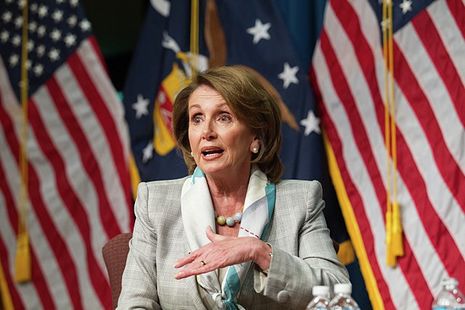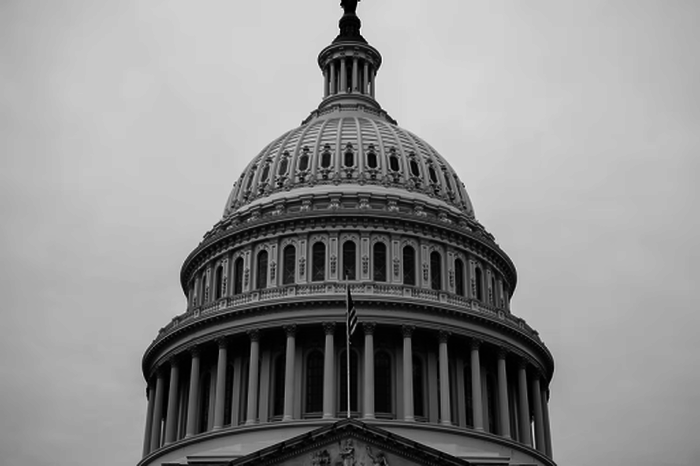Nancy Pelosi at the Union: the Special Relationship is ‘stronger than ever’
The Speaker of the US House of Representatives sat down with Union President Keir Bradwell to discuss environmental justice, the January 6th riots at the US Capitol and ‘the impeachment of what’s-his-name’

Nancy Pelosi spoke at the Cambridge Union on Thursday (16/09), interviewed by current President Keir Bradwell. Pelosi is the most senior incumbent US politician to speak at the Union and the first international speaker to appear in person since the beginning of the pandemic.
The event began with the presentation of an honorary Union membership to Speaker Pelosi, offered in honour of the values that both the Union and Pelosi represent and pursue, which include free speech and debate.
Pelosi then took the floor to give an opening speech. She outlined some of her personal aims as Speaker of the House, with a strong focus on environmental justice as a link between “economic justice, educational access” and other areas in which she believes that “justice is in peril”.
Pelosi and Bradwell began their conversation with a discussion of the January 6th insurrection at the Capitol. Despite describing the event as “bloody...dirty...crude and horrible”, Pelosi said it was important for the Speaker to return to the Capitol, “a temple of democracy for the world”.
To the question of whether she was surprised by the violent Republican reaction to Biden’s election, the Speaker replied that she absolutely was not, “the former president did not invent [the rioters] … but he galvanized them”. This domestic terrorism is evident in voter suppression bills being passed across the country, argued Pelosi, but not without responses from the House of Representatives. In particular, she cited bills HR1 and HR4, currently under discussion in the Senate, which both aim to counteract gerrymandering and nullification.
They also touched on 45th US President Donald Trump’s two impeachments. The Speaker said she speaks infrequently about Trump but she did affirm that “we had no choice” but to impeach him: “This president acted in a way that was in violation of the constitution, undermined our national security and jeopardized the integrity of our elections. That was just the first time” he was impeached.
The last point of discussion between the Speaker and Bradwell was the US retrograde from Afghanistan, and the Special Relationship. Pelosi felt that Relationship was “stronger than ever...if there’s one thing that you would take away from here today it would be the soundness of that Special Relationship from our perspective and our country”. On the retrograde, Pelosi remarked that she thought it should have happened sooner.
The Speaker then opened herself up to questions from the house, the first of which came from Varsity Co-Editor Nick Bartlett, who asked about the role of universities in negotiating relations with China, in light of the defence deal signed between the UK, US and Australia, as well as the recent revelations about Cambridge University’s connections to Huawei. Pelosi described the deal as a “strong and appropriate” response to security and economic threats in the South China Sea. She agreed that China is “getting worse in terms of suppression and freedom of speech” but that nonetheless “we have to work together on climate.”
The next question from the house asked for Speaker Pelosi’s thoughts on the likelihood of the Equal Rights Amendment passing in the Senate. Pelosi described difficulties in getting enough votes for the amendment and underlined the importance of public engagement with the issue: “We want people to know what is at stake with the Equal Rights Amendment”. She also described a bill passed in the House but awaiting discussion in the Senate, the Equality Act, which would extend the Civil Rights Bill to include the protection of LGBTQ+ citizens from discrimination and harassment.
Speaker Pelosi was then asked about the future of the Supreme Court; she agreed that there is a discussion to be had on reform and reported that President Biden had established a commission to evaluate the matter. She also described a bill in progress, the Reconciliation Bill, which is part of her endeavour to “build back better.”
The final question from the house asked about the Speaker’s role in limiting Donald Trump’s power between January 7th and the inauguration of President Biden. Pelosi responded citing concerns within the government that Trump’s access to nuclear power in the lead up to the inauguration threatened the “peaceful transfer of power”.
Speaker Pelosi closed by recalling Thomas Jefferson’s efforts “to build the infrastructure of America” and stressed the roles of science and the arts as uniting forces in addressing the climate crisis and other injustices. She urged the house to think big: “You have to have a big vision...it is your future, you have to take responsibility for it”.
 Comment / Plastic pubs: the problem with Cambridge alehouses 5 January 2026
Comment / Plastic pubs: the problem with Cambridge alehouses 5 January 2026 News / Uni-linked firms rank among Cambridgeshire’s largest7 January 2026
News / Uni-linked firms rank among Cambridgeshire’s largest7 January 2026 News / New movement ‘Cambridge is Chopped’ launched to fight against hate crime7 January 2026
News / New movement ‘Cambridge is Chopped’ launched to fight against hate crime7 January 2026 News / SU stops offering student discounts8 January 2026
News / SU stops offering student discounts8 January 2026 News / Cambridge businesses concerned infrastructure delays will hurt growth5 January 2026
News / Cambridge businesses concerned infrastructure delays will hurt growth5 January 2026









